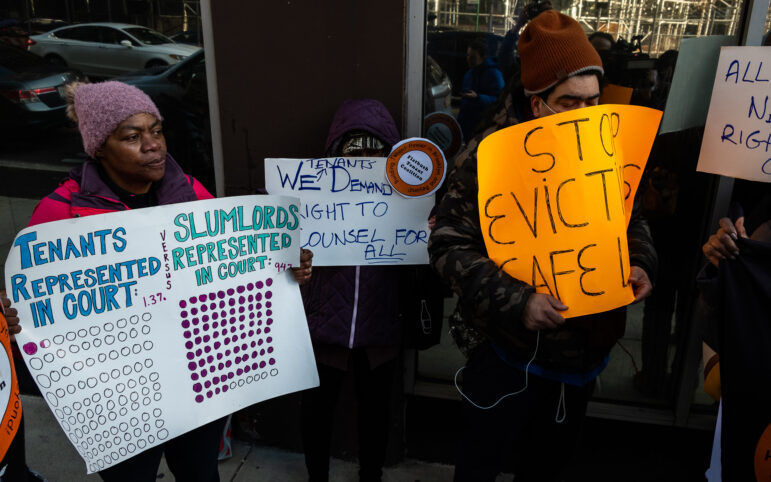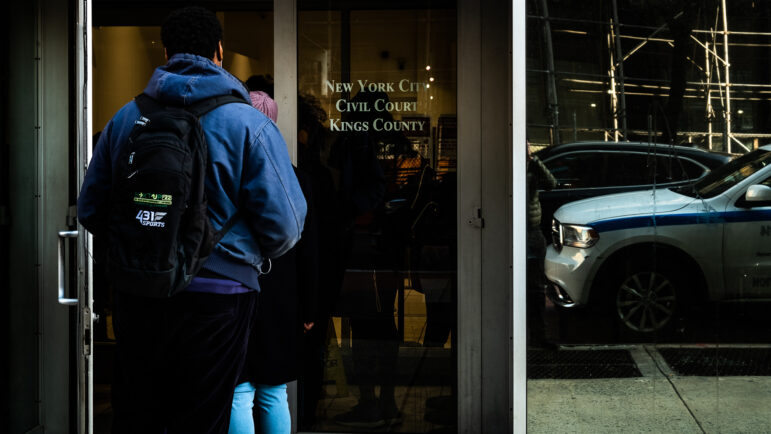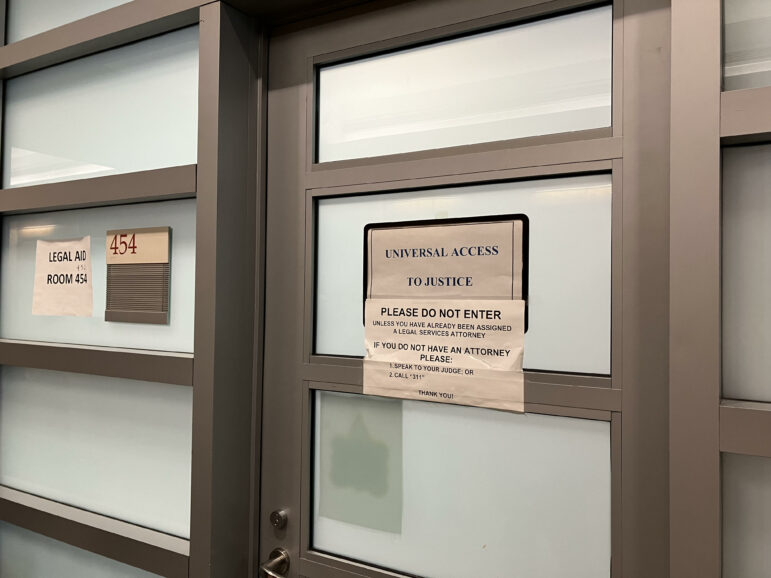“It’s a complicated question,” said Rosalind Black, citywide housing director at Legal Services NY, which aids tenants under the landmark city initiative to provide free representation to low-income New Yorkers facing eviction in housing court. Though the results have been overwhelmingly positive, the program has never been funded to cover every eligible tenant.

Adi Talwar
Activists rallied outside Brooklyn Housing Court last month in support of more funding for the Right to Counsel initiative.One question came up repeatedly during a recent hearing at City Hall: what would it take to ensure that New York City’s Right to Counsel program, which provides free lawyers to low-income tenants facing eviction, lives up to its name?
The initiative, passed by city lawmakers in 2017 and billed as the first in the nation to provide “universal access” to housing court attorneys for those eligible, has struggled in recent months to keep up with demand, prompting calls to both slow down the speed of eviction cases and increase city funding in order to add staff.
“Have you collectively at any point come up with a number that would make you whole?” Councilmember Diana Ayala, who chairs the City Council’s General Welfare Committee, asked a panel of nonprofit attorneys.
“It’s a complicated question,” replied Rosalind Black, citywide housing director at Legal Services NYC which, along with the Legal Aid Society, received the program’s largest contracts last year.
Did the city want to know what it would take to meet their current obligation to represent about 35,000 households per year, while offering brief advice to others? Or how much it would cost to represent the likely tens of thousands of tenants who qualify for representation, yet will inevitably be left out unless the program is scaled up?
Black and her colleagues were not prepared to answer either question at the March 27 hearing. But they’ve since settled on two figures they say would build meaningfully on the roughly $110 million they currently receive per year.
An extra $125 million would allow legal services providers to fairly fund their current contracts, according to estimates signed off on by Legal Services NYC, the Legal Aid Society, New York Legal Assistance Group and others. With $226 million more, they expect they would be able to cover an anticipated 71,400 qualifying cases in the coming year—only about half of which they’re currently contracted to take on.
Absent from the total $461 million ask is the cost of representing all tenants over 60 facing eviction regardless of income, an offering poised to kick in this August under separate legislation passed by the Council in January.
In a statement, the New York City Department of Social Services (DSS) said that it is currently “identifying additional legal services providers” to support Right to Counsel, and that at-risk tenants are a top priority.
Yet Mayor Eric Adams’ administration has not committed to a specific funding increase for the coming year, or endorsed the legal services providers’ methodology.
City Limits reviewed recent contracts and spoke to legal services providers, city officials and staff attorneys to better understand this inflection point for the Right to Counsel program – and why its needs are difficult to quantify.
Cases covered
Now in its sixth year, Right to Counsel funds legal services organizations to provide representation to tenants who earn 200 percent of the federal poverty level or less, or $49,720 for a family of three. Prior to its inception, tenants seldom had access to counsel when their landlords sought to evict them through the courts.
Cynthia Aderogba, a Queens tenant, appeared in housing court last week to meet with her free lawyer, who she matched with a few months ago. “It made a really big difference,” she told City Limits. “And it also brought a sense of comfortability for me, because I felt like I wasn’t by myself.”
Though the results have been overwhelmingly positive—the vast majority of tenants who get lawyers are able to stay in their home—the program has never been funded with the expectation of covering every eligible tenant. The pandemic, which accelerated the program’s citywide expansion, simply made this reality impossible to ignore.
“We all need to acknowledge that this program is massively underfunded and is never going to meet this need unless it grows,” Black of Legal Services NYC told City Limits.
Structural challenges include noncompetitive wages for attorneys and steep caseloads. Providers say they’re seeing high rates of attrition, one reason cases are taking longer to resolve than they did pre-pandemic.
The Office of Civil Justice, or OCJ, which operates within DSS, administers the Right to Counsel program. Its annual reports track how many households receive legal representation, and how many face eviction without a lawyer.

Adi Talwar
People entering Brooklyn Housing Court at 141 Livingston St. on the morning of March 20, 2023.For example, the year ending last June saw city-funded eviction defense for 23,483 households. Looking just at the period from April to June, 63 percent of tenants who appeared in housing court had legal representation, down from 71 percent for that period in 2021.
Yet the reports do not include information on tenant income, making it hard to know how many qualifying households miss out. In order to estimate how many tenants will likely qualify for Right to Counsel in the coming year, providers had to make certain assumptions.
First, they set 120,000 as the number of anticipated eviction filings, extrapolating off of monthly filing rates late last year, which were still below pre-pandemic levels.
Black then discounted 30 percent of that total to account for cases in which the tenant settles outside of court or never shows up, based on analysis by the financial advisory firm Stout Risius Ross LLC, which has studied the cost of Right to Counsel programs nationally.
“Thirty percent reflects a relatively high rate of connection to legal services based on the analysis we’ve done elsewhere in the country,” said Stout manager Neil Steinkamp. “And that expectation would be consistent with a city that has had the right to counsel for a while, has had a lot of outreach related to it.”
Black cut the resulting volume by 15 percent to account for tenants who will likely out-earn the program, landing on 71,400 eligible cases.
Steinkamp noted that estimating income eligibility is particularly difficult, because courts don’t collect that information. Researchers must look to academic studies, and the information collected by attorneys themselves. “It can still be valuable, but you have to appreciate the limitations of it,” he said.
Contracts for the year ending in June show full representation requirements of 32,900 cases, plus further service targets that can be met either through full representation or brief legal advice to a tenant facing eviction. The city, which structures its contracts to pay for “units of service,” stressed that providers have built-in flexibility, and can count three advice sessions as one unit of full representation.
This is not the preferred scenario, according to Marika Dias, managing director of the Safety Net Project at the Urban Justice Center, a Right to Counsel provider. “Obviously the providers want to meet the full representation goals, but that’s not necessarily possible under the current conditions,” she said.
Dollars and cents
Calculating the cost of Right to Counsel is difficult, in part, because the Adams Administration and attorneys disagree about how the city’s various legal services contracts should be categorized.
The providers point to what the city refers to as Homelessness Prevention Law Project contracts, which include explicit directions to represent households “pursuant to the NYC Right-to-Counsel law.” A batch reviewed by City Limits for the year ending in June is worth about $112 million.
But the city said it currently funds tenant legal services with $166 million, combining eviction defense with counsel for tenants seeking apartment repairs and rent reductions. The latter are supported by Anti-Harassment Tenant Protection (AHTP) contracts.
The city says the two are inextricably linked, since AHTP attorneys can keep tenants from getting to the point of eviction.
But providers insist AHTP is distinct and should be funded separately, and that blurring the lines has come at a cost to tenants seeking repairs as well as lawyers pulled in two directions at once. Their demand for an additional $125 million would build on the Homelessness Prevention Law Project contracts, and factors in 25 percent salary increases for about 480 lawyers currently working on Right to Counsel.
The $226 million they seek for the suspected larger universe of Right to Counsel cases could help hire more than 880 additional staff attorneys at current salaries—no 25 percent boost—plus paralegals and intake staff.
“We weren’t trying to be more conservative just for conservative’s sake, but there are just so many unknowns,” Adriene Holder, chief attorney for the civil practice at the Legal Aid Society, told City Limits.
Meanwhile, some unionized staff attorneys are pushing for a cap of four new cases per month that could further impact program costs.
Joanna Laine, a Legal Aid attorney and member of her union’s bargaining committee, said expanding the program without reducing caseloads would be futile, as attrition will worsen. She has about 70 open cases herself, a situation she described as a nightmare.
“We need sustainable wages and above all sustainable case caps,” Laine said. “If we aren’t able to keep the experienced attorneys we already have, we’re not going to be able to build up the program to sustain it.”
Facing the gap
In the near term, legal services providers have their eyes on City Hall. The City Council has called for an additional $195 million for civil and criminal public interest lawyers in the budget due in June, with a tentative demand of $70 million for Right to Counsel—an amount they acknowledge won’t expand the program.
Manhattan Councilmember Shaun Abreu, a former tenant attorney himself, said that he plans to push for more—a task that will be made easier if state lawmakers pitch in. “I’m telling you right now, that this council is going to hold the line on Right to Counsel,” Abreu told City Limits.
DSS did not comment on attorneys’ demand for $461 million. However, an agency spokesperson said courts should slow down cases to ensure tenants don’t face judges without an attorney in the near term—a position DSS officials had refused to take at last month’s oversight hearing.
According to an emailed statement, DSS is “supportive of any efforts which would help slow down the calendaring of cases by the courts.”
A recent Tuesday morning in Queens Housing Court showed how attorneys are struggling to keep up with demand under the current scope of Right to Counsel.

Emma Whitford
Room 454 at Queens Housing Court, where tenants can sign up for free legal representation in their eviction cases and are either matched with an attorney or receive brief legal advice.Four lawyers with Communities Resist were tasked with client intake that day. The organization is an AHTP provider, contracting with the city to help tenants sue their landlords for things like compelling repairs. But it has recently been pulled into assisting with Right to Counsel on a rotating basis.
“Our work is supposed to be meeting with tenants… having tenant association meetings, which we still have to do even if we’re here, right?” said Lino Diaz, a senior staff attorney on call that day.
Of the 50 tenants who signed up for legal assistance, 24 were ultimately deemed income-eligible for Right to Counsel. Another 14 earned too much to qualify, and a further dozen showed up despite not having court appearances that day. Communities Resist ended up taking on nine tenants, offering brief legal advice to the others.
Mona Fletcher, a part-time nanny and speech pathology student, sat outside of the intake room Tuesday having failed to match with a lawyer on a previous court date. “There was a nice gentleman in there, he just gave me a little bit of advice, but he said that he couldn’t represent me because he had other cases,” she told City Limits.
Going before a judge without counsel is intimidating, she added: “For someone like me that is in school, trying to finish up, this weighs on my mind.”
Being the first city in the country to implement a right to counsel program for tenants puts New York in a unique position, according to Holder of Legal Aid. There’s no textbook to follow when it comes to adequate funding.
“Right to Counsel is in its infancy stages,” Holder said. “And everyone wants us to run and twirl but we’re barely out of the crawling stage. So people need to understand that we’re going to need to continue to refine how this work is done, but we need resources to do it.”
Annie Iezzi and Frank Festa contributed reporting for this story.








